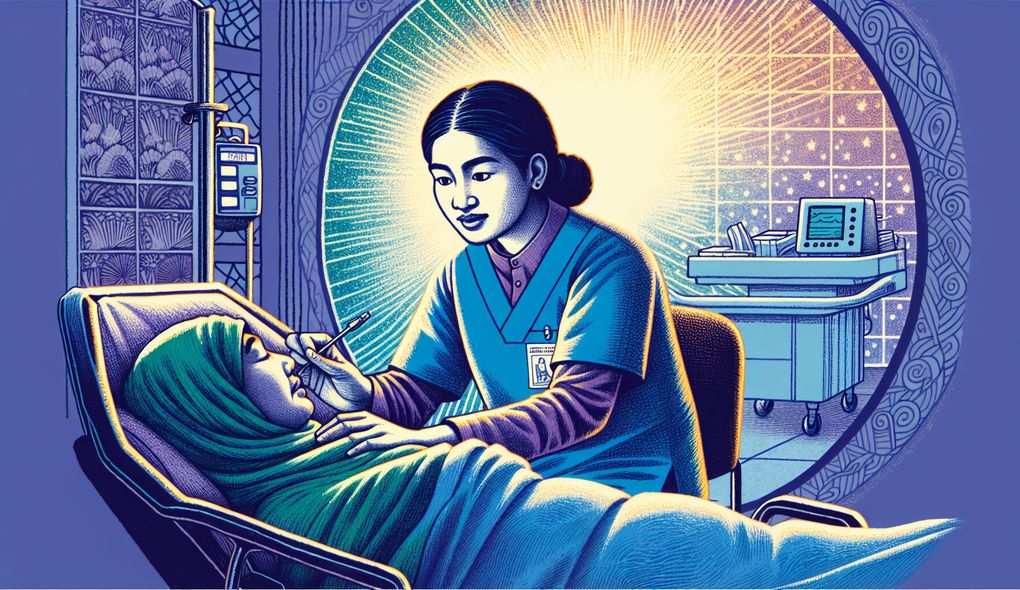What steps do you take to monitor patient vital signs and condition during labor and delivery?
SENIOR LEVEL

Sample answer to the question:
To monitor patient vital signs and condition during labor and delivery, I take a systematic approach. First, I assess the mother's baseline vital signs, including blood pressure, heart rate, and temperature. I also monitor her oxygen saturation levels using a pulse oximeter. Throughout the labor process, I continuously monitor these vital signs and document any changes or abnormalities. Additionally, I closely observe the mother's contractions and assess the progress of labor. I also keep a close eye on the fetal heart rate using a fetal monitor. This allows me to identify any signs of distress or complications for both the mother and the baby. If I notice any concerning changes, I take immediate action by notifying the obstetrician and implementing appropriate interventions to ensure the safety and well-being of both the mother and the baby.
Here is a more solid answer:
Monitoring patient vital signs and condition during labor and delivery requires a comprehensive approach that draws on my strong clinical skills in labor and delivery care. First and foremost, I prioritize regular assessments of the mother's vital signs, including blood pressure, heart rate, and temperature. I am vigilant in monitoring for any deviations from the baseline and promptly intervene if necessary. Additionally, I closely monitor the mother's contractions and assess the progress of labor to ensure everything is proceeding normally. To monitor the baby's well-being, I utilize fetal monitoring techniques to continuously evaluate the fetal heart rate patterns and promptly address any abnormalities. Moreover, I am well-versed in the current best practices in maternal and neonatal health care, allowing me to make informed decisions when faced with critical situations. My ability to stay calm under pressure enables me to make quick decisions in the best interest of the mother and baby. Lastly, my strong organizational and leadership skills ensure that I effectively document vital signs, progress, and interventions, and collaborate seamlessly with the obstetrician and other healthcare providers to provide optimal care.
Why is this a more solid answer?
The solid answer provides more specific details about the candidate's clinical skills, knowledge of best practices, decision-making abilities, and organizational and leadership skills. It highlights the candidate's ability to monitor both the mother and baby's vital signs, assess labor progress, and make informed decisions. However, it can be further improved by including examples or specific projects that demonstrate their expertise in these areas.
An example of a exceptional answer:
Throughout my 5+ years of experience as a Labor and Delivery Nurse Practitioner, I have developed a highly effective approach to monitoring patient vital signs and condition during labor and delivery. Starting with a thorough assessment of the mother's baseline vital signs, such as blood pressure, heart rate, and temperature, I utilize advanced monitoring technologies to ensure accurate and continuous measurements. For instance, I am proficient in using invasive arterial blood pressure monitoring in high-risk cases to obtain real-time data. To enhance the accuracy of fetal monitoring, I am skilled in interpreting fetal heart rate tracings and using scalp electrode monitoring when needed. In addition to vital signs, I pay close attention to the mother's pain level, emotional well-being, and overall experience during labor. My extensive knowledge of the current best practices in maternal and neonatal health care allows me to provide evidence-based care and make informed decisions in complex situations. Furthermore, my strong organizational skills ensure that I maintain detailed and up-to-date patient records, allowing for seamless communication and collaboration with the multidisciplinary team. My leadership abilities shine when coordinating care during emergencies or when assisting in cesarean sections or other surgical procedures. Overall, my comprehensive approach to monitoring patient vital signs and condition, combined with my exceptional clinical skills and dedication to patient-centered care, enables me to provide the highest quality care during labor and delivery.
Why is this an exceptional answer?
The exceptional answer demonstrates the candidate's extensive experience and expertise in monitoring patient vital signs and condition during labor and delivery. They go beyond the basics and discuss advanced monitoring technologies and techniques they are proficient in, such as invasive arterial blood pressure monitoring and scalp electrode monitoring. The answer also highlights the candidate's ability to address the mother's emotional well-being and pain level, and their advanced knowledge of best practices in maternal and neonatal health care. Additionally, the candidate showcases their organizational skills in maintaining detailed patient records and their leadership abilities in coordinating care during emergencies and surgical procedures. The answer provides a comprehensive and detailed account of the candidate's capabilities in monitoring patient vital signs and condition during labor and delivery.
How to prepare for this question:
- Review and familiarize yourself with current best practices in maternal and neonatal health care, as staying informed about advancements in the field is crucial for providing high-quality care.
- Reflect on your past experiences in labor and delivery settings and identify specific instances where you demonstrated strong clinical skills, made quick decisions under pressure, or exhibited strong organizational and leadership skills. Be prepared to discuss these examples during the interview.
- Practice explaining complex medical concepts related to monitoring patient vital signs and condition during labor and delivery in simple and concise language. This will help you communicate effectively during the interview.
- Brush up on your knowledge of different electronic medical record (EMR) systems used in labor and delivery settings, as familiarity with these systems is a valuable asset.
- Consider seeking additional certifications or continuing education in areas relevant to labor and delivery care, such as advanced fetal monitoring or neonatal resuscitation, to showcase your commitment to professional development.
What are interviewers evaluating with this question?
- Clinical skills in labor and delivery care
- Knowledge of current best practices in maternal and neonatal health care
- Ability to make quick and informed decisions under pressure
- Strong organizational and leadership skills

